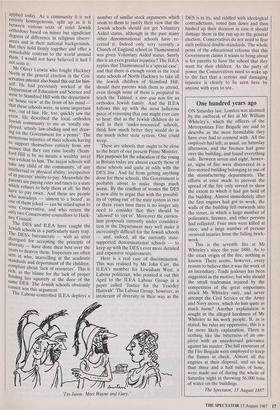NO JUSTICE FOR JEWISH CHILDREN
Michael Trend on the
harsh treatment of orthodox schools in London
ANYONE who has driven through the Stamford Hill area of north London will know that for a brief space one seems to enter a different world. Men with long dark beards and side ringlets, broad black hats and satiny coats bustle round streets filled with shops, schools and foundations that are obviously Jewish. For this is the centre of a large strictly orthodox Jewish community. It would, indeed, be easy enough to think that this was some sort of theocentric 'ghetto', cut off from the world around it; but very wrong, as I discovered recently when I visited many of the local Jewish schools, drawn by the claim that a great injustice was being done to the children of this community.
It is, of course, school holidays at the moment and walking through the bare classrooms, with their red-painted floors and heavy ink-stained ex-LCC forms, one could readily imagine that one was on a film set for a turn of the century rural Polish drama. And yet I was irresistibly reminded of years spent in the similarly spartan atmosphere of a cold Kent prep school in the early 1960s, an academy of the mens sana in corpore sano variety, on which I increasingly look back with pro- found gratitude. I soon realised that this feeling was brought about because the Jewish teacher who was showing me around his school, the Yesodey Hatorah, was a courteous but strong and determined man, who believed in order and peace; though not a humourless man he took his position very seriously. He was, in a quiet way, passionately concerned with the education of the children in his charge, and regarded it as a duty to ensure that each of them could read, write and count at as early an age as possible and, moreover, that each took away at the end of their time at the school a set body of acquired knowledge. This would give them, he believed, the ability to be masters of the world they live in. It would not be too much to say that this objective was, in his view, a matter of life and death.
One also learnt much the same thing at the schools run by the Lubavich foundation, whose leader has written ab- out how 'the rod of education' should not be spared the child. This, of course, reflects Solomon's view that 'he who spares the rod hates his child', and it has ever been desired for Jewish children in an effort to prepare them to be able to 'choose life' for themselves. My prep-school head- master would not have put it in quite these words but he would have understood ex- actly what was meant. Having been a school governor in Hack- ney (the borough in which most of these Jewish schools are located), I could easily make a comparison. The contrast was enormous. Truancy, vandalism, theft and bad manners are quite unknown in the Jewish schools while they are endemic in the schools run by the Inner London Education Authority. And the Jewish chil- dren I met who attended these schools were happy, self-confident and proud of what they knew. One should not, of course, imagine that all elements of the strictly orthodox Jewish way of life seem entirely attractive to an outsider, but the only moment of real anxiety that I had at the Jewish schools was when I was in danger of coming a poor second in a general knowledge and spelling test to a ten-year-old girl pupil who also showed a terrifying aptitude for dividing fractions. The academic results of all the Jewish schools are very impressive. At the Yesodey Hatorah senior girls' school some 40 per cent or more of the pupils in an average year achieve at least three '0' levels graded A to C by the London Board. This is typical of all the Jewish schools. The average for the ILEA schools in Hackney is only some seven to eight per cent.
So where is the great injustice, you may ask? There are 25 orthodox Jewish schools in this area, looking after the education of around 3,600 children, and none of them receives any financial help from the state even though the 1944 Education Act re- quires local education authorities to see that all children are entitled to an educa- tion in accordance with the wishes of their parents, and many denominational schools throughout the country are financed on this basis.
The orthodox Jews in Stamford Hill are surely a grouping to which that much misused word 'community' can be properly applied today. As a community it is not i entirely homogeneous, split up as it is between various sects of strict Jewish orthodoxy based on minor but significant degrees of difference in religious observ- ances and in their national backgrounds. But they hold firmly together and offer a remarkable contrast to the world around them. I would not have believed it had I not seen it.
Mr Oliver Letwin who fought Hackney North at the general election in the Con- servative interest also found this out for him- self. He had previously worked at the Department of Education and Science and went to Stamford Hill with the departmen- tal 'house view' at the front of his mind that these schools were in some important way, out of line. He, too, quickly saw the error. He described the local orthodox Jewish community to me as 'totally em- ployed, utterly law-abiding and not draw- ing on the Government for a penny'. The monstrous injustice of their schools having to support themselves entirely from any money that they can raise locally (Stam- ford Hill is by no means a wealthy area) was evident to him. The major schools will take any child of the community, of any intellectual or physical ability, irrespective of its parents' ability to pay. Meanwhile the parents are paying rates and taxes to a state which refuses to help them at all. So they have to pay twice. And these are people who nowadays — 'almost to a beard', as one of them joked — can be relied upon to vote Conservative, and who return the only two Conservative councillors to Hack- ney Council.
The DES and ILEA have caught the Jewish schools in a particularly nasty trap. The DES's bureaucrats — with an utter disregard for accepting the principle of diversity — have done their best over the years to destroy them. Inspectors are often sent in who, marvelling at the academic standards and deportment of the children, complain about 'lack of resources'. This is rich, as the blame for the lack of proper funding lies squarely at the door of the same DES. The Jewish schools obviously cannot win this argument. The Labour-controlled ILEA deploys a
number of similar stock arguments which seem to them to justify their view that the Jewish schools should not get Voluntary Aided status, although in the past many other denominational schools have re- ceived it. Indeed only very recently a Church of England school in Thamesmead was given Voluntary Aided status. Surely this is an even greater injustice? The ILEA replies that Thamesmead is a 'special case'; and that there is enough room in the local state schools of North Hackney to take all the Jewish children of Stamford Hill, should their parents wish them to attend, even though none of them is prepared to teach the Talmud, a sine qua non for an orthodox Jewish family. And the ILEA follows this up with the most ludicrous piece of reasoning that one might ever care to hear: that as the Jewish children do so well in their 'under-resourced' schools, think how much better they would do in the much richer state system. One could weep.
These are schools that ought to be close to the heart of our present Prime Minister. Her purposes for the education of the young in Britain today are almost exactly those of these schools and quite at odds with the DES line. And far from getting anything done for these schools, this Government is probably about to make things much worse. By the cruellest of ironies the DES is now able to argue that with the possibil- ity of 'opting out' of the state system in two or three years time there is no longer any need to consider that they should be `allowed' to 'opt in'. Moreover the curricu- lum proposals currently under considera- tion in the Department may well make it increasingly difficult for the Jewish schools — and, indeed, all the currently state- supported denominational schools — to keep up with the DES's ever more detailed and expensive requirements.
Here is a real case of discrimination. This was realised by Mr John Carr, the ILEA's member for Lewisham West, a Labour politician, who pointed it out this April to the ILEA Labour Group in a paper called 'Justice for the Yesodey Hatorah'. The Labour Group, however, as intolerant of diversity in their way as the
DES is in its, and riddled with ideological contradictions, voted him down and then hushed up their decision in case it should damage them in the run-up to the general election. Conservatives do not need to fear such political double-standards. The whole point of the educational reforms that this Government claims it wants to bring about is for parents to have the school that they want for their children. As the party of power the Conservatives need to wake up to the fact that a serious and damaging injustice is clearly to be seen here by anyone with eyes to see.



















































 Previous page
Previous page